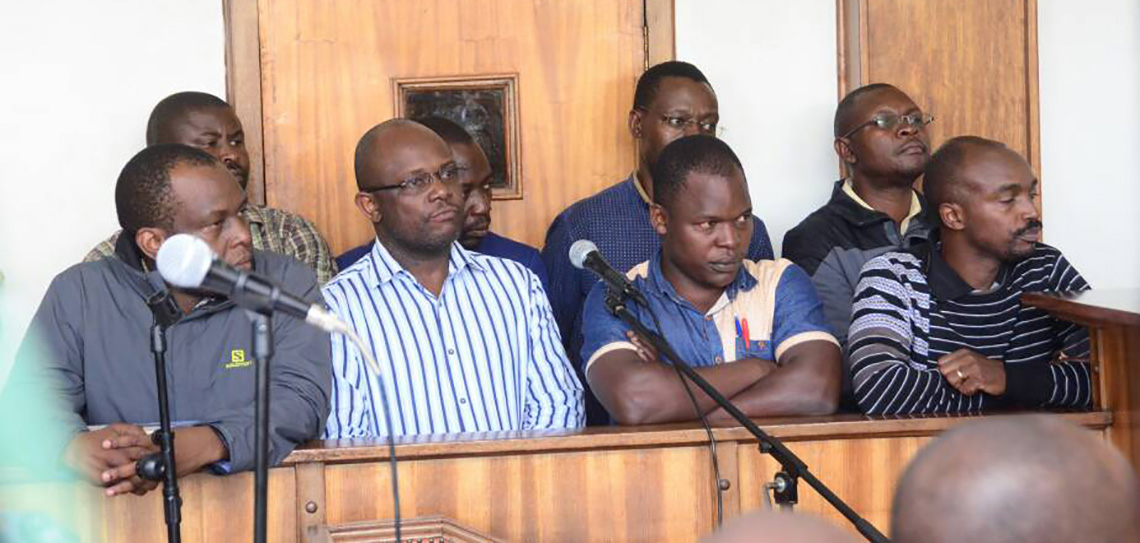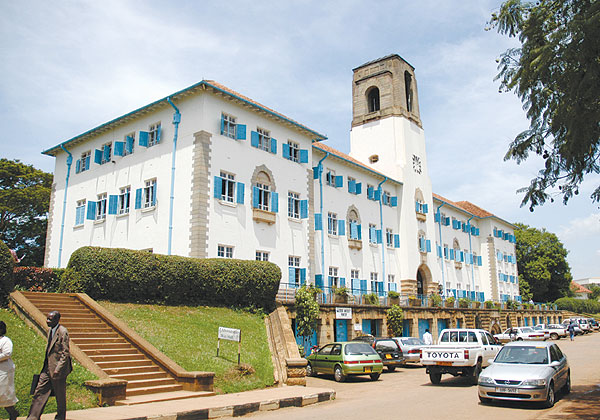Devotion Takes Center Stage Priests Prostrate Before the Altar During Ordination Ceremony
The Catholic Church has warned its followers in various dioceses within the Kampala province on the presence of individuals falsely representing themselves as Bishops and a priest from West Africa. Over the weekend, photos emerged of some people dressed as Roman Catholic Bishops in Byeyogerere, in Kampala.
According to one parishioner in Byeyogerere, these individuals claimed to be bishops visiting Uganda and attempted to conduct a Mass in the area. “They claimed to be bishops on a visit to Uganda. Am told they might have tried to hold a mass in the area,” the faithful said.
When our reporter made inquiries from authorities at the Kampala Archdiocesan headquarters suited at Lubaga, it was revealed that the identity of this group, suspected to be from West Africa, remains unknown. Rev. Fr. Joseph Mukiibi, the Communications Director of the Kampala archdiocese, confirmed that they have received a similar report but have no knowledge of any foreign bishop in the country. He also mentioned that the archdiocese has initiated an inquiry into the matter.
Furthermore, Rev. Fr. Mukiibi emphasized that within the Catholic Church, visiting Bishops are required to notify the local ordinary or parish priests in advance before conducting Mass. He urged the faithful not to attend Mass celebrated by individuals who are unfamiliar with the area’s parish priests.
Additionally, a former seminarian, Francis Xervier Luyinda, who was previously discontinued from his studies reemerged as an ordained priest and is said to be active in the Lugazi and Masaka dioceses. Msgr. Richard Kayondo, the Vicar General of the Lugazi diocese, explained that this individual, originally from Masaka, was once a seminarian undergoing training to become a priest of the Lugazi diocese.
He added that Luyinda had completed studies at St. Thomas Aquinas National Major Seminary-Katigondo and was soon finishing his theological studies at St. Paul’s National Major Seminary – Kinyamasika.
However, despite being on the path to becoming a priest, he was removed from the formation process. Msgr. Kayondo expressed his surprise at the individual’s presence in the diocese, falsely claiming to have been ordained.
The vicar general adds that there have been reports and allegations that after being discontinued from his seminary studies, the individual in question traveled to Cameroon, where he allegedly received ordination. However, Lugazi Diocese has conducted inquiries with authorities in Cameroon and has been informed that Luyinda was not ordained within the Roman Catholic Church there.
“The president of the National Episcopal Conference of Cameroon Archbishop Andrew Nkeya…he said, from the photo we sent him, that the bishop who performed the ordination is not a catholic bishop. The said ordination was not valid,” a letter from Bishop Christopher Kakooza on the matter reads in part.
Msgr. Kayondo explains that typically when a seminarian at advanced stages is dismissed, the course of action may vary depending on the reason for their dismissal.
If requested by the individual, the diocese can offer assistance in finding alternative paths. Some may opt to join religious congregations, and in certain circumstances, they might eventually be ordained as priests.
He added, “Mr. Luyinda did not follow this standard route; instead, he associated with fraudulent individuals and later returned, claiming to be a priest.” Meanwhile, Rev. Fr. Ronald Mayanja, the communication officer for Masaka, also mentioned that they have received information suggesting that Luyinda has relatives or connections within Masaka.
Nevertheless, he emphasized that, in accordance with the guidelines, it is nearly impossible for an imposter or a foreign priest, whether from Uganda or elsewhere, to come and conduct Mass in Masaka’s parish without prior authorization from the relevant authorities.
“We have not received any reports of him conducting Mass or attempting to do so in Masaka. Our organizational structure is well-established, and all priests, lay leaders, and faithful are familiar with these procedures. One cannot simply appear out of nowhere. Even a priest from our diocese cannot perform Mass in a parish where they are not assigned without obtaining permission,” noted Rev. Fr. Mayanja.
He also mentioned that in light of this incident, the diocese will need to reinforce these guidelines through its existing structures. The Canon Law of the Catholic Church provides guidelines and regulations for priests celebrating Mass outside of their diocese, but the specific requirements can vary depending on the circumstances and the particular diocese’s policies.
Canon 903 indicates that a priest can be permitted to celebrate even if the rector of the church, or area, does not know him, provided that either he presents a letter of introduction from his ordinary or superior, issued at least within the year, or it can be judged prudently that he is not impeded from celebrating.
Several Catholic dioceses’ administrative handbooks, as reviewed by our reporter, outline the process for priests seeking to conduct ministry outside their archdiocese for specific events or assignments, such as weddings, baptisms, funerals, retreats, or convocations are required to be given a letter of suitability from their superiors.
Likewise, parish priests can accommodate non-local priests who are not restricted by canon law for short-term visits, allowing them to celebrate Mass after getting a current letter of suitability from their diocesan bishop or religious superior, confirming their good standing in their home diocese or religious institute and granting permission for ministry in another diocese during the specified period.
-URN





